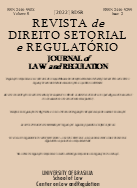Desafios na regulação de Big Techs e como a Teoria da Regulação Responsiva pode auxiliar na solução
Palavras-chave:
Regulação. Big Techs. Tecnologia. Desafios. Regulação Responsiva.Resumo
[Propósito] Analisar os principais fundamentos da Teoria da Regulação Responsiva em relação ao poder sancionatório do regulador, e sua aplicabilidade ao mercado de tecnologia (Big Techs).
[Metodologia/abordagem/design] Além da abordagem teórica, selecionou-se a plataforma Facebook como modelo concreto para comparação com a Teoria.
[Resultados] O modelo regulatório responsivo, especialmente no que concerne à gradação de sanções, revela-se o mais adequado para as Big Techs.
[Implicações práticas] É fato que a regulação de Big Techs é assunto relativamente recente, pois acompanha o estágio de desenvolvimento da tecnologia - que, inegavelmente, teve um salto expressivo nos últimos anos. Dessa forma, as conclusões deste trabalho podem auxiliar em debate que ainda é insipiente no meio jurídico brasileiro.
Downloads
Referências
ADAMS, T. Facebook’s week of shame: the Cambridge Analytica fallout. The Guardian, Londres, Marrço 2018. Disponivel em: <https://www.theguardian.com/technology/2018/mar/24/facebook-week-of-shame-data-breach-observer-revelations-zuckerberg-silence>.
ARANHA, M. I.; LOPES, O. D. A. Estudo sobre Teorias Jurídicas da Regução Apoiadas em Incentivos. UNB/ANATEL. Brasília. 2019.
AUSTRALIAN National University - Profiles. Australian National University, 2022. Disponivel em: <https://researchprofiles.anu.edu.au/en/persons/john-braithwaite>. Acesso em: 08 maio 2022.
AYRES, I.; BRAITHWAITE, J. Responsive Regulation - Transcending the Deregulation Debate. Nova Iorque: Oxford University Press, 1992. Acesso em: 08 maio 2022.
BAHADUR, N. What It's Like When Your Rapist Appears Under Facebook's 'People You May Know'. Huffpost, 20 abril 2015. Disponivel em: <https://www.huffpost.com/entry/kevin-kantor-people-you-may-know_n_7100968>. Acesso em: 26 abr. 2022.
BRAITHWAITE, J. John Braithwaite. UBC Law Review, Vancouver, 44, n. 3, 2011. 475-520. Disponivel em: <http://johnbraithwaite.com/wp-content/uploads/2016/03/essence_responsive_regulation.pdf>. Acesso em: 08 maio 2022.
CADWALLADR, C.; GRAHAM-HARRISON, E. How Cambridge Analytica turned Facebook ‘likes’ into a lucrative political tool. The Guardian, Londres, Março 2018. Disponivel em: <https://www.theguardian.com/technology/2018/mar/17/facebook-cambridge-analytica-kogan-data-algorithm?CMP=soc_568>. Acesso em: 06 maio 2022.
CADWALLADR, C.; GRAHAM-HARRISON, E.; TOWNSEND, M. Revealed: Brexit insider claims Vote Leave team may have breached spending limits. The Guardian, Londres, Março 2018. Disponivel em: <https://www.theguardian.com/politics/2018/mar/24/brexit-whistleblower-cambridge-analytica-beleave-vote-leave-shahmir-sanni>. Acesso em: 06 maio 2022.
CANAL TECHCRUNCH. Mark Pincus On Zynga Revenue. Youtube, 6 novembro 2009. Disponivel em: <https://www.youtube.com/watch?v=S7YaVVpK1G4>. Acesso em: 29 abr. 2022.
DAVIES, H. Ted Cruz using firm that harvested data on millions of unwitting Facebook users. The Guardian, Londres, dezembro 2015. Disponivel em: <https://www.theguardian.com/us-news/2015/dec/11/senator-ted-cruz-president-campaign-facebook-user-data>. Acesso em: 06 maio 2022.
FEDERAL TRADE COMISSION (FTC). Complaint in the Matter of FACEBOOK, INC., a corporation. United States Federal Trade Comission. Estados Unidos. 2011. (0923184).
HILL, K. Facebook recommended that this psychiatrist's patients friend each other. Splinter, 2016. Disponivel em: <https://splinternews.com/facebook-recommended-that-this-psychiatrists-patients-f-1793861472>. Acesso em: 26 abr. 2022.
HILL, K. How Facebook Outs Sex Workers. Gizmodo, 2017. Disponivel em: <https://gizmodo.com/how-facebook-outs-sex-workers-1818861596>. Acesso em: 26 abr. 2022.
HILL, K. 'People You May Know:' A Controversial Facebook Feature's 10-Year History. GIZMODO, 2018. Disponivel em: <https://gizmodo.com/people-you-may-know-a-controversial-facebook-features-1827981959>. Acesso em: 27 abr. 2022.
LEVY, S. Facebook: The Inside Story. Nova Iorque: Dutton, v. 1, 2020.
LOPES, O. D. A. Fundamentos da Regulação. Rio de Janeiro: Editora Processo, 2018.
META. Meta, 2007. Disponivel em: <https://about.fb.com/news/2007/05/facebook-unveils-platform-for-developers-of-social-applications/>. Acesso em: 06 maio 2022.
NEATE, R. Facebook faces biggest legal battle in years as US officials launch lawsuits. The Guardian, Londres, Dezembro 2020. Disponivel em: <https://www.theguardian.com/technology/2020/dec/10/facebook-faces-biggest-legal-battle-in-years-as-us-officials-launch-lawsuits>.
PIERSON, D. Facebook needed third-party apps to grow. Now it’s left with a privacy crisis. Los Angeles Times, Los Angeles, Março 2018. Disponivel em: <https://www.latimes.com/business/technology/la-fi-tn-facebook-third-parties-20180320-story.html>. Acesso em: 06 maio 2022.
STIEGLER, G. The Theory of Economic Regulation. The Bell Journal of Economics and Management Science, 2, n. 1, 1971. 3-21. Disponivel em: <http://www.jstor.org/stable/3003160>.
TAMBINI, D.; MOORE, M. Regulating Big Tech. 1. ed. Nova Iorque: Oxford University Press, 2022.
VICTOR, D. FarmVille Once Took Over Facebook. Now Everything Is FarmVille. The New York Times, Nova Iorque, Janeiro 2021. Disponivel em: <https://www.nytimes.com/2020/12/31/technology/farmville-zynga-facebook.html>. Acesso em: 06 maio 2022.
WILLSON, M.; LEAVER, T. Zynga’s FarmVille, social games, and the ethics of big data mining. Communication Research and Practice, Austrália, 1, Junho 2015. 147-158. Disponivel em: <https://www.tandfonline.com/toc/rcrp20/1/2?nav=tocList>. Acesso em: 29 abr. 2022.
YALE Law School - Our Faculty - Ian Ayres. Yale Law School, 2022. Disponivel em: <https://law.yale.edu/ian-ayres>. Acesso em: 08 maio 2022.
ZUCKERBERG, M. Is Connectivity a Human Right? Meta, 21 Agosto 2013. Disponivel em: <https://about.fb.com/news/2013/08/mark-zuckerberg-is-connectivity-a-human-right/>. Acesso em: 07 maio 2022.
Downloads
Publicado
Como Citar
Edição
Seção
Licença
Copyright (c) 2022 Journal of Law and Regulation

Este trabalho está licenciado sob uma licença Creative Commons Attribution 4.0 International License.
Ao submeter seu artigo à Revista de Direito, Estado e Telecomunicações, declaro aceitar a licença de publicação Creative Commons Attribution 4.0 International (CC BY 4.0), disponível em http://creativecommons.org/licenses/by/4.0.


